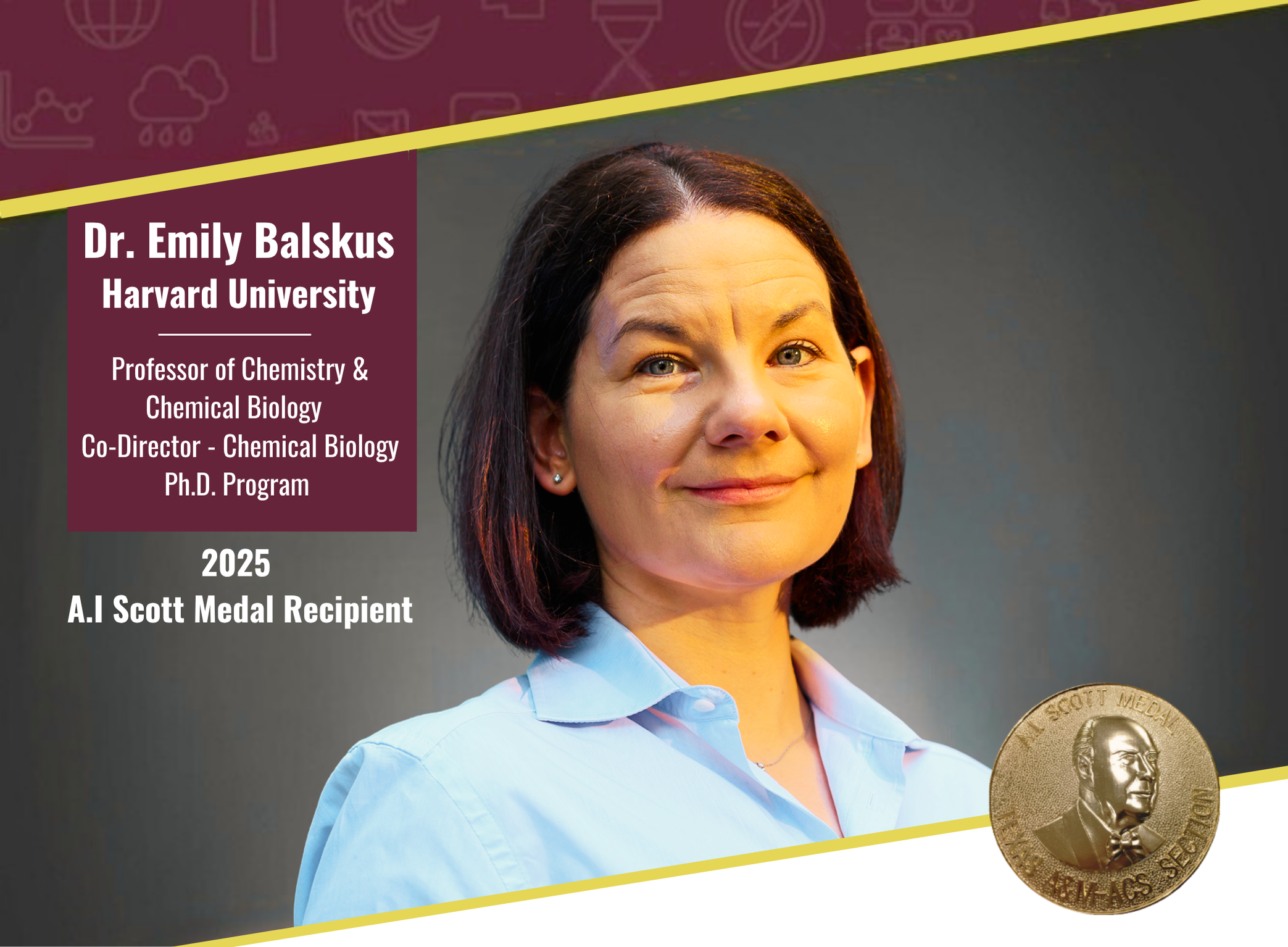
Dr. Emily Balskus, Thomas Dudley Cabot Professor of Chemistry and Howard Hughes Medical Institute Investigator, has been selected as the recipient of the 2025 A.I. Scott Medal for Excellence in Biological Chemistry Research, named for one of the most influential faculty members of Texas A&M’s rich chemistry-related history.
The medal is jointly awarded each year by the Texas A&M Department of Chemistry and the Texas A&M Section of the American Chemical Society in tribute to Dr. A. Ian Scott, a Texas A&M distinguished professor of chemistry who made tremendous scientific contributions, both to the university and to the international chemistry community, during his 30-year career. His career was much longer than this. He spent 30 years at Texas A&M.
Balskus will be honored during an afternoon symposium on Oct. 31 in Texas A&M's Interdisciplinary Life Sciences Building. The event includes a keynote presentation, “Deciphering Microbes and Microbiomes with Chemistry,” at 4:30 p.m. delivered by Balskus.
The event will also feature the following preceding talks:
- Biosynthesis of Bioactive Small Molecules by Bo Li, The University of North Carolina, Chapel Hill
- Structure and Mechanism of Iron-Dependent Oxidases and Oxygenases by Amie Boal, Pennsylvania State University
The symposium will be followed by an invitation-only dinner, during which Balskus will be presented with the Scott Medal.
Scott Known for Work on B12, Taxol and Penicillin
Scott was a pioneering chemist who joined Texas A&M in 1977 and achieved worldwide recognition for his discoveries on how bacteria produce vitamin B12, as well as his studies on the cancer drug Taxol and the antibiotic penicillin. Named a distinguished professor of chemistry and biochemistry at Texas A&M in 1981, Scott held the Robert A. Welch Chair in Chemistry and was also the D.H.R. Barton Professor of Chemistry. His wide-ranging contributions fundamentally impacted the field of biosynthetic investigation and helped revolutionize both organic and natural product chemistry before his death in 2007 at age 79.
Breaking Ground in Chemical Biology and Microbial Chemistry
A pioneering bioorganic chemist in her own right, Balskus’ research integrates chemical and biological approaches to decipher the metabolic language of the human microbiome. Her lab strives to discover new biochemical pathways and enzymes, interpret their biological purposes, and examine how they link to human health and disease.
Major research achievements of the Balskus Group include characterizing the structure and mode of action of gut bacterial genotoxin colibactin, a DNA-damaging bacterial genotoxin linked to colon cancer. Her team has discovered enzymes within the human gut microbiome, including glycyl radical enzymes, carbohydrate metabolizing enzymes within the vaginal microbiome, and has shed light on biosynthetic pathways that employ unprecedented enzymatic reactions.
The group pioneers methods and approaches that integrate microbiology and chemistry to elucidate microbiome biology and to create innovative therapeutic strategies to eliminate pathogenic bacteria and treat diseases.
Balskus first became interested in chemistry during high school and eventually graduated from Williams College in 2002 as a valedictorian with highest honors in chemistry. After spending a year at the University of Cambridge as a Churchill Scholar with Dr. Steven Ley, she attended Harvard University to pursue her graduate studies in the Department of Chemistry and Chemical Biology with Dr. Eric Jacobsen centered around the application and synthesis of complex molecules and the development of asymmetrical catalytic transformations. Afterward, she spent three years as a National Institutes of Health postdoctoral fellow at Harvard Medical School in the lab of Dr. Christopher T. Walsh, where her research focused on understanding and characterizing biosynthetic pathways for the production of small-molecule sunscreens in photosynthetic bacteria.
Balskus is the Thomas Dudley Cabot Professor of Chemistry and a Howard Hughes Medical Institute Investigator, as well as an institute member of the Broad Institute of Harvard and MIT. Her research has been recognized with various awards, including the Smith Family Award for Excellence in Biomedical Research, the 2012 NIH Director’s New Innovator Award, the 2013 Packard Fellowship for Science and Engineering, the 2018 Arthur C. Cope Scholar Award from the American Chemical Society, and the 2019 Blavatnik Award for Young Scientists in Chemistry. Notably, in 2020, Balskus was awarded the Alan T. Waterman Award from the National Science Foundation, making her the first female scientist out of the six scientists from Harvard to receive this award.
For more information on the Scott Medal Symposium, contact the Texas A&M Department of Chemistry at (979) 845-9829 or via email at chemhead@chem.tamu.edu.
